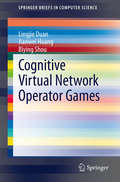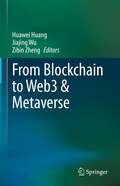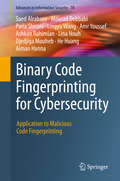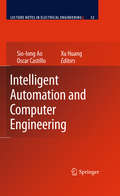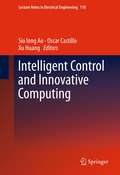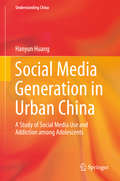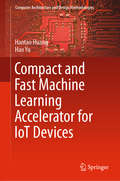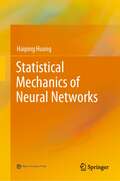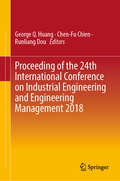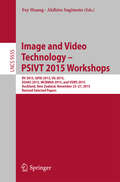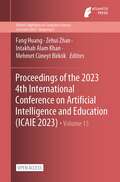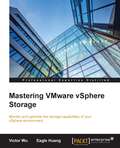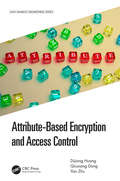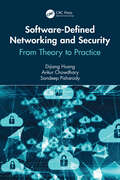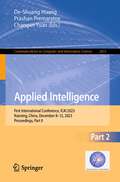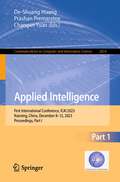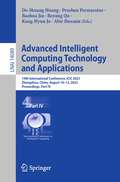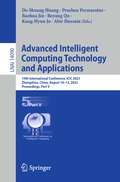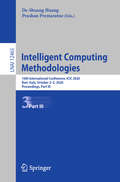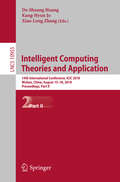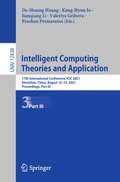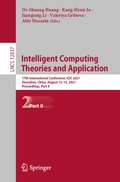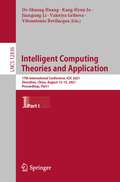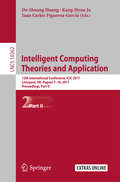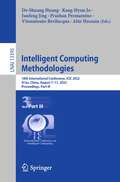- Table View
- List View
Cognitive Virtual Network Operator Games (SpringerBriefs in Computer Science)
by Jianwei Huang Lingjie Duan Biying ShouThis SpringerBrief provides an overview of cognitive mobile virtual network operator's (C-MVNO) decisions under investment flexibility, supply uncertainty, and market competition in cognitive radio networks. This is a new research area at the nexus of cognitive radio engineering and microeconomics. The authors focus on an operator's joint spectrum investment and service pricing decisions. The readers will learn how to tradeoff the two flexible investment choices (dynamic spectrum leasing and spectrum sensing) under supply uncertainty. Furthermore, if there is more than one operator, we present analysis of the competition among operators in obtaining spectrum and pricing services to attract users. The brief is designed for professionals working with C-MVNOs. Succinct and practical, it will assist them in making optimal investments and pricing decisions. It will also be of interest to researchers.
From Blockchain to Web3 & Metaverse
by Huawei Huang Jiajing Wu Zibin ZhengThe Metaverse seamlessly integrates the real world with the virtual world and allows avatars to engage in a broad range of activities including entertainment, social networking, and trading. In this book, we dive into the Metaverse by discussing how blockchains connect various Metaverse components, digital currencies, and blockchain-empowered applications in the virtual world. On the other hand, Web3 has also attracted considerable attention due to its uniquely decentralized characteristics. The digital economy, currently undergoing a rapid development, is a critical driver to highly efficient societies. It is imperative that we investigate how to use Web3 technologies to address the critical concerns encountered during the development of the digital economy by fully exploring Web3. In this book, we also share insights into the Web3-based ecosystem in the Metaverse; topics of interest include decentralized finance, digital assets, the asset-trading market, etc. Unlike most works on the subject, this book mainly concentrates on insights and discussions regarding blockchain, the Metaverse and Web3. In other words, it focuses on using blockchain technologies to enable an ecosystem for both the Metaverse and Web3. Topics addressed include blockchain fundamentals, smart contracts, value circulation in the Metaverse, the connection between the Metaverse and Web3, the establishment of the Metaverse on the basis of blockchain technologies, decentralized autonomous organization, decentralized storage, digital economy, Web3-based economic systems for the Metaverse, etc. This book will be a valuable resource for students, researchers, engineers, and policymakers working in various areas related to blockchain, the Metaverse and Web3. We hope that it will also inspire readers from academia and industry alike, and ultimately help them create a truly open, fair, and rational ecosystem for the Metaverse and Web3.
Binary Code Fingerprinting for Cybersecurity: Application to Malicious Code Fingerprinting (Advances in Information Security #78)
by He Huang Lingyu Wang Mourad Debbabi Amr Youssef Djedjiga Mouheb Saed Alrabaee Paria Shirani Ashkan Rahimian Lina Nouh Aiman HannaThis book addresses automated software fingerprinting in binary code, especially for cybersecurity applications. The reader will gain a thorough understanding of binary code analysis and several software fingerprinting techniques for cybersecurity applications, such as malware detection, vulnerability analysis, and digital forensics. More specifically, it starts with an overview of binary code analysis and its challenges, and then discusses the existing state-of-the-art approaches and their cybersecurity applications. Furthermore, it discusses and details a set of practical techniques for compiler provenance extraction, library function identification, function fingerprinting, code reuse detection, free open-source software identification, vulnerability search, and authorship attribution. It also illustrates several case studies to demonstrate the efficiency, scalability and accuracy of the above-mentioned proposed techniques and tools. This book also introduces several innovative quantitative and qualitative techniques that synergistically leverage machine learning, program analysis, and software engineering methods to solve binary code fingerprinting problems, which are highly relevant to cybersecurity and digital forensics applications. The above-mentioned techniques are cautiously designed to gain satisfactory levels of efficiency and accuracy. Researchers working in academia, industry and governmental agencies focusing on Cybersecurity will want to purchase this book. Software engineers and advanced-level students studying computer science, computer engineering and software engineering will also want to purchase this book.
Intelligent Automation and Computer Engineering
by He Huang Oscar CastilloA large international conference in Intelligent Automation and Computer Engineering was held in Hong Kong, March 18-20, 2009, under the auspices of the International MultiConference of Engineers and Computer Scientists (IMECS 2009). The IMECS is organized by the International Association of Engineers (IAENG). Intelligent Automation and Computer Engineering contains 37 revised and extended research articles written by prominent researchers participating in the conference. Topics covered include artificial intelligence, decision supporting systems, automated planning, automation systems, control engineering, systems identification, modelling and simulation, communication systems, signal processing, and industrial applications. Intelligent Automation and Computer Engineering offers the state of the art of tremendous advances in intelligent automation and computer engineering and also serves as an excellent reference text for researchers and graduate students, working on intelligent automation and computer engineering.
Intelligent Control and Innovative Computing (Lecture Notes in Electrical Engineering #110)
by He Huang Sio Iong Ao Oscar CastilloA large international conference on Advances in Intelligent Control and Innovative Computing was held in Hong Kong, March March 16-18, 2011, under the auspices of the International MultiConference of Engineers and Computer Scientists (IMECS 2010). The IMECS is organized by the International Association of Engineers (IAENG). Intelligent Control and Computer Engineering contains 25 revised and extended research articles written by prominent researchers participating in the conference. Topics covered include artificial intelligence, control engineering, decision supporting systems, automated planning, automation systems, systems identification, modelling and simulation, communication systems, signal processing, and industrial applications. Intelligent Control and Innovative Computing offers the state of the art of tremendous advances in intelligent control and computer engineering and also serves as an excellent reference text for researchers and graduate students, working on intelligent control and computer engineering.
Social Media Generation in Urban China
by Hanyun HuangSocial media such as instant messaging (IM), social networking sites (SNS), blogs and microblogs are an integral part of adolescents' lives in China. Anecdotal evidence reported in the news has suggested that the increasing popularity of social media could make adolescents more vulnerable to being addicted. This exploratory study proposes the concept of "social media addiction" and examines (a) whether social media addiction exists among adolescents in urban China and, if so, who the addicts are, what their symptoms are and to what extent they are addicted; (b) whether sociopsychological traits (e. g. , need for affiliation, impression management, narcissism and leisure boredom) can predict social media addiction among adolescents; (c) what gratifications are obtained by adolescents from their use of social media and whether these gratifications can predict social media addiction and (d) to what degree social media addiction influences adolescents' academic performance and social capital. This study employed quantitative questionnaire surveys among adolescents as the main research method, supplemented by qualitative pre-survey focus groups among adolescents and post-survey in-depth interviews among parents and teachers. Questionnaire surveys were conducted based on a multi-stage cluster sampling of seven middle schools in five urban Chinese cities: Beijing, Shanghai, Guangzhou, Shenzhen and Xiamen. The final sample consisted of 1,549 adolescents, of whom 90% had used social media. Using Young's classic definition of Internet addiction, 15. 6% of participants were classified as social media addicts. The addicted adolescents were often self-absorbed, bored with their leisure time, and good at using manipulation through social media for impression management. Addicts experienced four major social media addiction symptoms: preoccupation, adverse consequences, alleviation of negative emotions and loss of interest in social activities. The seven social media gratifications identified in this study can be categorized into social, information and entertainment gratifications. Among these, entertainment gratifications had the most power to predict social media addiction, while information gratifications were the least likely to lead to addiction. Furthermore, these gratifications were found to be powerful mediators between the adolescents' sociopsychological traits and social media addiction. Finally, the results also indicated that social media addiction and its symptoms had a significant negative impact on adolescents' academic performance and social capital.
Compact and Fast Machine Learning Accelerator for IoT Devices (Computer Architecture and Design Methodologies)
by Hantao Huang Hao YuThis book presents the latest techniques for machine learning based data analytics on IoT edge devices. A comprehensive literature review on neural network compression and machine learning accelerator is presented from both algorithm level optimization and hardware architecture optimization. Coverage focuses on shallow and deep neural network with real applications on smart buildings. The authors also discuss hardware architecture design with coverage focusing on both CMOS based computing systems and the new emerging Resistive Random-Access Memory (RRAM) based systems. Detailed case studies such as indoor positioning, energy management and intrusion detection are also presented for smart buildings.
Statistical Mechanics of Neural Networks
by Haiping HuangThis book highlights a comprehensive introduction to the fundamental statistical mechanics underneath the inner workings of neural networks. The book discusses in details important concepts and techniques including the cavity method, the mean-field theory, replica techniques, the Nishimori condition, variational methods, the dynamical mean-field theory, unsupervised learning, associative memory models, perceptron models, the chaos theory of recurrent neural networks, and eigen-spectrums of neural networks, walking new learners through the theories and must-have skillsets to understand and use neural networks. The book focuses on quantitative frameworks of neural network models where the underlying mechanisms can be precisely isolated by physics of mathematical beauty and theoretical predictions. It is a good reference for students, researchers, and practitioners in the area of neural networks.
Proceeding of the 24th International Conference on Industrial Engineering and Engineering Management 2018
by George Q. Huang Chen-Fu Chien Runliang DouThis book records the new research findings and development in the field of industrial engineering, and it will serve as the guidebook for the potential development in industrial engineering and smart manufacturing. It gathers the accepted papers from the 24th International conference on Industrial Engineering and Engineering Management held at Central South University of Forestry and Technology in Changsha during May 19-20, 2018. The aim of this conference was to provide a high-level international forum for experts, scholars and entrepreneurs at home and abroad to present the recent advances, new techniques and application, to promote discussion and interaction among academics, researchers and professionals to promote the developments and applications of the related theories and technologies in universities and enterprises, and to establish business or research relations to find global partners for future collaboration in the field of Industrial Engineering. It addresses diverse themes in smart manufacturing, artificial intelligence, ergonomics, simulation and modeling, quality and reliability, logistics engineering, data mining and other related fields. This timely book summarizes and promotes the latest achievements in the field of industrial engineering and related fields over the past year, proposing prospects and vision for the further development.
Image and Video Technology - PSIVT 2015 Workshops
by Fay Huang Akihiro SugimotoThis book constitutes the thoroughly refereedpost-conference proceedings of six international workshops held in theframework of the 7th Pacific-Rim Symposium on Image and Video Technology, PSIVT2015, during November 23-24, 2015, in Auckland, New Zealand. The 29 revised full papers presented werecarefully selected from 58 submissions. Their topics diversely ranged fromwell-established areas to novel current trends: robot vision, RV 2015; 2D and3D geometric properties from incomplete data, GPID 2015; vision meets graphics,VG 2015; passive and active electro-optical sensors for aerial and spaceimaging, EO4AS 2015; mathematical and computational methods in biomedicalimaging and image analysis, MCBMIIA 2015; and video surveillance, VSWS 2015.
Proceedings of the 2023 4th International Conference on Artificial Intelligence and Education (Atlantis Highlights in Computer Sciences #15)
by Fang Huang Zehui Zhan Intakhab Alam Khan Mehmet Cüneyt BirkökThis is an open access book.ICAIE started in 2020, the last two sessions of ICAIE have all been successfully published and indexed by EI & Scopus (Read more). ICAIE is to bring together innovative academics and industrial experts in the field of Artificial Intelligence and Education to a common forum.And we achieved the primary goal which is to promote research and developmental activities in Artificial Intelligence and Education, and another goal is to promote scientific information interchange between researchers, developers, engineers, students, and practitioners working all around the world.The 2023 4th International Conference on Artificial Intelligence and Education(ICAIE 2023)Jointly sponsored by Thailand Naresuan University and the Center for Social Computing Research of Central South University of China, and will be held in Guilin, China during June 16–18, 2023. The meeting focused on the new trends in the development of "artificial intelligence" and "education" under the new situation, and jointly discussed how to empower and promote the high-quality development of "artificial intelligence" and "education". An ideal platform to share views and experiences with industry experts.The conference invites experts and scholars in the field to conduct wonderful exchanges based on their own research results based on the development of the times. The themes are around artificial intelligence technology and applications; intelligent and knowledge-based systems; information-based education; intelligent learning; advanced information theory and neural network technology ; software computing and algorithms; intelligent algorithms and computing and many other topics.We warmly invite you to participate in ICAIE 2023 and look forward to seeing you in Guilin, China!
Mastering VMware vSphere Storage
by Eagle Huang Victor WuThis book is for users who have already worked with the VMware vSphere platform and who want to design a VMware vSphere Storage solution and troubleshoot issues.
Attribute-Based Encryption and Access Control (Data-Enabled Engineering)
by Dijiang Huang Qiuxiang Dong Yan ZhuThis book covers a broader scope of Attribute-Based Encryption (ABE), from the background knowledge, to specific constructions, theoretic proofs, and applications. The goal is to provide in-depth knowledge usable for college students and researchers who want to have a comprehensive understanding of ABE schemes and novel ABE-enabled research and applications. The specific focus is to present the development of using new ABE features such as group-based access, ID-based revocation, and attributes management functions such as delegation, federation, and interoperability. These new capabilities can build a new ABE-based Attribute-Based Access Control (ABAC) solution that can incorporate data access policies and control into ciphertext. This book is also ideal for IT companies to provide them with the most recent technologies and research on how to implement data access control models for mobile and data-centric applications, where data access control does not need to rely on a fixed access control infrastructure. It’s also of interested to those working in security, to enable them to have the most recent developments in data access control such as ICN and Blockchain technologies. Features Covers cryptographic background knowledge for ABE and ABAC Features various ABE constructions to achieve integrated access control capabilities Offers a comprehensive coverage of ABE-based ABAC Provides ABE applications with real-world examples Advances the ABE research to support new mobile and data-centric applications
Software-Defined Networking and Security: From Theory to Practice (Data-Enabled Engineering)
by Dijiang Huang Ankur Chowdhary Sandeep PisharodyThis book provides readers insights into cyber maneuvering or adaptive and intelligent cyber defense. It describes the required models and security supporting functions that enable the analysis of potential threats, detection of attacks, and implementation of countermeasures while expending attacker resources and preserving user experience. This book not only presents significant education-oriented content, but uses advanced content to reveal a blueprint for helping network security professionals design and implement a secure Software-Defined Infrastructure (SDI) for cloud networking environments. These solutions are a less intrusive alternative to security countermeasures taken at the host level and offer centralized control of the distributed network. The concepts, techniques, and strategies discussed in this book are ideal for students, educators, and security practitioners looking for a clear and concise text to avant-garde cyber security installations or simply to use as a reference. Hand-on labs and lecture slides are located at http://virtualnetworksecurity.thothlab.com/. Features Discusses virtual network security concepts Considers proactive security using moving target defense Reviews attack representation models based on attack graphs and attack trees Examines service function chaining in virtual networks with security considerations Recognizes machine learning and AI in network security
Applied Intelligence: First International Conference, ICAI 2023, Nanning, China, December 8–12, 2023, Proceedings, Part II (Communications in Computer and Information Science #2015)
by De-Shuang Huang Prashan Premaratne Changan YuanThis 2-volume set CCIS 2014 and CCIS 2015 constitutes the post-conference proceedings of the First International Conference on Applied Intelligence, ICAI 2023, held in Nanning, China, December 8–12, 2023.The 64 full papers presented in this proceedings were carefully selected and reviewed from 228 submissions. The papers cover a wide range on theoretical aspects of biomedical data modeling and mining; computer vision; and deep learning. They were organized in topical sections as follows:Part I: Biomedical data modeling and mining; computer vision; deep learning; Part II: Intelligent control and automation; machine learning; natural language processing and computational linguistics.
Applied Intelligence: First International Conference, ICAI 2023, Nanning, China, December 8–12, 2023, Proceedings, Part I (Communications in Computer and Information Science #2014)
by De-Shuang Huang Prashan Premaratne Changan YuanThis 2-volume set CCIS 2014 and CCIS 2015 constitutes the post-conference proceedings of the First International Conference on Applied Intelligence, ICAI 2023, held in Nanning, China, December 8–12, 2023.The 64 full papers presented in this proceedings were carefully selected and reviewed from 228 submissions. The papers cover a wide range on theoretical aspects of biomedical data modeling and mining; computer vision; and deep learning. They were organized in topical sections as follows:Part I: Biomedical data modeling and mining; computer vision; deep learning; Part II: Intelligent control and automation; machine learning; natural language processing and computational linguistics.
Advanced Intelligent Computing Technology and Applications: 19th International Conference, ICIC 2023, Zhengzhou, China, August 10–13, 2023, Proceedings, Part IV (Lecture Notes in Computer Science #14089)
by De-Shuang Huang Prashan Premaratne Baohua Jin Boyang Qu Kang-Hyun Jo Abir HussainThis three-volume set of LNCS 14086, LNCS 14087 and LNCS 14088 constitutes - in conjunction with the double-volume set LNAI 14089-14090- the refereed proceedings of the 19th International Conference on Intelligent Computing, ICIC 2023, held in Zhengzhou, China, in August 2023.The 337 full papers of the three proceedings volumes were carefully reviewed and selected from 828 submissions. This year, the conference concentrated mainly on the theories and methodologies as well as the emerging applications of intelligent computing. Its aim was to unify the picture of contemporary intelligent computing techniques as an integral concept that highlights the trends in advanced computational intelligence and bridges theoretical research with applications. Therefore, the theme for this conference was "Advanced Intelligent Computing Technology and Applications". Papers that focused on this theme were solicited, addressing theories, methodologies, and applications in science and technology.
Advanced Intelligent Computing Technology and Applications: 19th International Conference, ICIC 2023, Zhengzhou, China, August 10–13, 2023, Proceedings, Part V (Lecture Notes in Computer Science #14090)
by De-Shuang Huang Prashan Premaratne Baohua Jin Boyang Qu Kang-Hyun Jo Abir HussainThis three-volume set of LNCS 14086, LNCS 14087 and LNCS 14088 constitutes - in conjunction with the double-volume set LNAI 14089-14090- the refereed proceedings of the 19th International Conference on Intelligent Computing, ICIC 2023, held in Zhengzhou, China, in August 2023.The 337 full papers of the three proceedings volumes were carefully reviewed and selected from 828 submissions. This year, the conference concentrated mainly on the theories and methodologies as well as the emerging applications of intelligent computing. Its aim was to unify the picture of contemporary intelligent computing techniques as an integral concept that highlights the trends in advanced computational intelligence and bridges theoretical research with applications. Therefore, the theme for this conference was "Advanced Intelligent Computing Technology and Applications". Papers that focused on this theme were solicited, addressing theories, methodologies, and applications in science and technology.
Intelligent Computing Methodologies: 16th International Conference, ICIC 2020, Bari, Italy, October 2–5, 2020, Proceedings, Part III (Lecture Notes in Computer Science #12465)
by De-Shuang Huang Prashan PremaratneThis two-volume set of LNCS 12463 and LNCS 12464 constitutes - in conjunction with the volume LNAI 12465 - the refereed proceedings of the 16th International Conference on Intelligent Computing, ICIC 2020, held in Bari, Italy, in October 2020. The 162 full papers of the three proceedings volumes were carefully reviewed and selected from 457 submissions. The ICIC theme unifies the picture of contemporary intelligent computing techniques as an integral concept that highlights the trends in advanced computational intelligence and bridges theoretical research with applications. The theme for this conference is “Advanced Intelligent Computing Methodologies and Applications.” Papers related to this theme are especially solicited, addressing theories, methodologies, and applications in science and technology.
Intelligent Computing Theories and Application: 14th International Conference, ICIC 2018, Wuhan, China, August 15-18, 2018, Proceedings, Part II (Lecture Notes in Computer Science #10955)
by De-Shuang Huang Kang-Hyun Jo Xiao-Long ZhangThis two-volume set LNCS 10954 and LNCS 10955 constitutes - in conjunction with the volume LNAI 10956 - the refereed proceedings of the 14th International Conference on Intelligent Computing, ICIC 2018, held in Wuhan, China, in August 2018. The 275 full papers and 72 short papers of the three proceedings volumes were carefully reviewed and selected from 632 submissions. The papers are organized in topical sections such as Neural Networks.- Pattern Recognition.- Image Processing.- Intelligent Computing in Robotics.- Intelligent Control and Automation.- Intelligent Data Analysis and Prediction.- Fuzzy Theory and Algorithms.- Supervised Learning.- Unsupervised Learning.- Kernel Methods and Supporting Vector Machines.- Knowledge Discovery and Data Mining.- Natural Language Processing and Computational Linguistics.- Gene Expression Array Analysis.- Systems Biology.- Computational Genomics.- Computational Proteomics.- Gene Regulation Modeling and Analysis.- Protein-Protein Interaction Prediction.- Next-Gen Sequencing and Metagenomics.- Structure Prediction and Folding.- Evolutionary Optimization for Scheduling.- High-Throughput Biomedical Data Integration and Mining.- Machine Learning Algorithms and Applications.- Heuristic Optimization Algorithms for Real-World Applications.- Evolutionary Multi-Objective Optimization and Its Applications.- Swarm Evolutionary Algorithms for Scheduling and Combinatorial.- Optimization.- Swarm Intelligence and Applications in Combinatorial Optimization.- Advances in Metaheuristic Optimization Algorithm.- Advances in Image Processing and Pattern Recognition Techniques.- AI in Biomedicine.- Bioinformatics.- Biometrics Recognition.- Information Security.- Virtual Reality and Human-Computer Interaction.- Healthcare Informatics Theory and Methods.- Intelligent Computing in Computer Vision.- Intelligent Agent and Web Applications.- Reinforcement Learning.- Machine Learning.- Modeling, Simulation, and Optimization of Biological Systems.- Biomedical Data Modeling and Mining.- Cheminformatics.- Intelligent Computing in Computational Biology.- Protein Structure and Function Prediction.- Biomarker Discovery.- Hybrid Computational Intelligence: Theory and Application in Bioinformatics, Computational Biology and Systems Biology.- IoT and Smart Data.- Intelligent Systems and Applications for Bioengineering.- Evolutionary Optimization: Foundations and Its Applications to Intelligent Data Analytics.- Protein and Gene Bioinformatics: Analysis, Algorithms and Applications.
Intelligent Computing Theories and Application: 17th International Conference, ICIC 2021, Shenzhen, China, August 12–15, 2021, Proceedings, Part III (Lecture Notes in Computer Science #12838)
by De-Shuang Huang Kang-Hyun Jo Jianqiang Li Valeriya Gribova Prashan PremaratneThis two-volume set of LNCS 12836 and LNCS 12837 constitutes - in conjunction with the volume LNAI 12838 - the refereed proceedings of the 17th International Conference on Intelligent Computing, ICIC 2021, held in Shenzhen, China in August 2021. The 192 full papers of the three proceedings volumes were carefully reviewed and selected from 458 submissions. The ICIC theme unifies the picture of contemporary intelligent computing techniques as an integral concept that highlights the trends in advanced computational intelligence and bridges theoretical research with applications. The theme for this conference is “Advanced Intelligent Computing Methodologies and Applications.”The papers are organized in the following subsections: Artificial Intelligence in Real World Applications, Biomedical Informatics Theory and Methods, Complex Diseases Informatics, Gene Regulation Modeling and Analysis, Intelligent Computing in Computational Biology, and Protein Structure and Function Prediction.
Intelligent Computing Theories and Application: 17th International Conference, ICIC 2021, Shenzhen, China, August 12–15, 2021, Proceedings, Part II (Lecture Notes in Computer Science #12837)
by De-Shuang Huang Kang-Hyun Jo Jianqiang Li Valeriya Gribova Abir HussainThis two-volume set of LNCS 12836 and LNCS 12837 constitutes - in conjunction with the volume LNAI 12838 - the refereed proceedings of the 17th International Conference on Intelligent Computing, ICIC 2021, held in Shenzhen, China in August 2021. The 192 full papers of the three proceedings volumes were carefully reviewed and selected from 458 submissions. The ICIC theme unifies the picture of contemporary intelligent computing techniques as an integral concept that highlights the trends in advanced computational intelligence and bridges theoretical research with applications. The theme for this conference is “Advanced Intelligent Computing Methodologies and Applications.” The papers are organized in the following subsections: Intelligent Computing in Computer Vision, Intelligent Control and Automation, Intelligent Modeling Technologies for Smart Cities, Machine Learning, and Theoretical Computational Intelligence and Applications.
Intelligent Computing Theories and Application: 17th International Conference, ICIC 2021, Shenzhen, China, August 12–15, 2021, Proceedings, Part I (Lecture Notes in Computer Science #12836)
by De-Shuang Huang Kang-Hyun Jo Jianqiang Li Valeriya Gribova Vitoantonio BevilacquaThis two-volume set of LNCS 12836 and LNCS 12837 constitutes - in conjunction with the volume LNAI 12838 - the refereed proceedings of the 17th International Conference on Intelligent Computing, ICIC 2021, held in Shenzhen, China in August 2021. The 192 full papers of the three proceedings volumes were carefully reviewed and selected from 458 submissions. The ICIC theme unifies the picture of contemporary intelligent computing techniques as an integral concept that highlights the trends in advanced computational intelligence and bridges theoretical research with applications. The theme for this conference is “Advanced Intelligent Computing Methodologies and Applications.” The papers are organized in the following subsections: Evolutionary Computation and Learning, Image and signal Processing, Information Security, Neural Networks, Pattern Recognition Swarm Intelligence and Optimization, and Virtual Reality and Human-Computer Interaction.
Intelligent Computing Theories and Application
by De-Shuang Huang Kang-Hyun Jo Juan Carlos Figueroa-GarcíaThe International Conference on Intelligent Computing (ICIC) was formed to provide an annual forum dedicated to the emerging and challenging topics in artificial intel- gence, machine learning, pattern recognition, image processing, bioinformatics, and computational biology. It aims to bring together researchers and practitioners from both academia and industry to share ideas, problems, and solutions related to the m- tifaceted aspects of intelligent computing. ICIC 2010, held in Changsha, China, August 18-21, 2010, constituted the 6th - ternational Conference on Intelligent Computing. It built upon the success of ICIC 2009, ICIC 2008, ICIC 2007, ICIC 2006, and ICIC 2005, that were held in Ulsan, Korea, Shanghai, Qingdao, Kunming and Hefei, China, respectively. This year, the conference concentrated mainly on the theories and methodologies as well as the emerging applications of intelligent computing. Its aim was to unify the picture of contemporary intelligent computing techniques as an integral concept that highlights the trends in advanced computational intelligence and bridges theoretical research with applications. Therefore, the theme for this conference was "Advanced Intelligent Computing Technology and Applications. " Papers focusing on this theme were solicited, addressing theories, methodologies, and applications in science and technology.
Intelligent Computing Methodologies: 18th International Conference, ICIC 2022, Xi'an, China, August 7–11, 2022, Proceedings, Part III (Lecture Notes in Computer Science #13395)
by De-Shuang Huang Kang-Hyun Jo Junfeng Jing Prashan Premaratne Vitoantonio Bevilacqua Abir HussainThis two-volume set of LNCS 13393 and LNCS 13394 constitutes - in conjunction with the volume LNAI 13395 - the refereed proceedings of the 18th International Conference on Intelligent Computing, ICIC 2022, held in Xi'an, China, in August 2022. The 209 full papers of the three proceedings volumes were carefully reviewed and selected from 449 submissions.This year, the conference concentrated mainly on the theories and methodologies as well as the emerging applications of intelligent computing. Its aim was to unify the picture of contemporary intelligent computing techniques as an integral concept that highlights the trends in advanced computational intelligence and bridges theoretical research with applications. Therefore, the theme for this conference was “Advanced Intelligent Computing Technology and Applications”. Papers focused on this theme were solicited, addressing theories, methodologies, and applications in science and technology.
